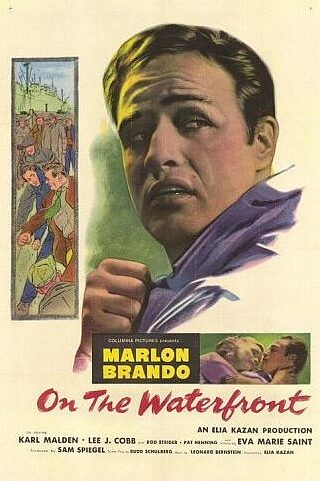On The Waterfront
 From Conservapedia
From Conservapedia On the Waterfront (1954) is "about a dumb innocent kid whose done terrible things and wants to be redeemed."[1] It is one of Hollywood's greatest films, showing strong conservative values regarding politics and religion, and exposing the evils of labor union gangsterism. It won eight Oscars, including Best Film.
Marlon Brando (Oscar for Best Actor) plays Terry Malloy, a young, svelte marble mouthed antihero, caught between his self-interest and his conscience. He is a former prize fighter ("I coulda been a contender"—but never was because he agreed to throw a fight so the mob would win their bets.) Will he become an informer against the mob? Is he motivated by democracy? love? revenge? Eva Marie Saint [Oscar for Best Supporting Actress], plays the neighborhood girl who returns from her upstate convent school to fall in love. Karl Malden (nominated for Best Supporting Actor) is the heroic priest, the voice of conscience, calling the workers to organize and take power democratically—to do their duty for God and for their own dignity. Lee J. Cobb (also nominated for Best Supporting Actor) is the ruthless totalitarian boss who takes a liking to Brando, and showers favors and punishments, and demands kickbacks, from every longshoreman. Rod Steiger (also nominated for Best Supporting Actor) is Terry's brother Charlie, torn between payoffs and family loyalty. The powerful music was composed by Leonard Bernsetin (nominated for Best Music).
Contents
Politics[edit]
The director, Elia Kazan (Oscar for Best Director) was a former Communist who broke with Stalin and informed on the Stalinists before the House Un-American Activities Committee. The left in Hollywood considered him a traitor to "the Cause," and fought relentlessly against any additional honors. Finally in 1999 Kazan was awarded an Honorary Oscar for lifetime achievement. He has been hailed for revolutionizing the roles of actors in film.
The writer was Budd Schulberg (Oscar for Best Screenplay), like Kazan a former Communist who testified.
In stunning contrast to the liberals who kept silent about the Communist subversion in Hollywood, the film portrays the informer as the hero; liberal Hollywood never forgave director Elia Kazan for his stunning film. In real life, Kazan, Malden and screenwriter Budd Schulberg all testified before Congress, along with Ronald Reagan. Together they broke the power of Communism in Hollywood.
Religion[edit]
Terry Malloy, who under the inspiration of a Catholic priest (Father Barry) becomes a Christ-like figure. Betrayed by his brother and almost killed by the gang, he finds the strength to overcome and redeem his people from the slavery to the mobsters who run the waterfront.
Plot[edit]
Terry, an ex-prizefighter, agrees to set up a meeting between a friend of his and thugs who intend to kill him for being a "canary" (informer). After Terry's friend plummets to his death from the rooftop, we meet the tough priest (Karl Malden) and the sister of the deceased, down from Tarrytown where she's studying with the sisters to become a teacher.
The rest of the movie centers on the priest's campaign to get someone to stand up to the mob brutality of John Friendly, corrupt boss of the longshoreman's union. After a meeting in the church, attendees are attacked by mobsters with pipes and baseball bats. One man agrees to testify, and the priest agrees to stick with this to the end.
However, this man is also murdered: the foreman causes a load of boxes to fall on him. The priest comes to give the last rites and turns it into a sermon condemning as a "crucifixion" acts such as oppressing the workers or keeping the code of D and D (remaining "deaf and dumb" to illegal acts). Terry stops one mobster from pelting the priest. Another man also threatens to take action if anyone else tries to stop the priest from speaking.
Terry starts trying to see the girl whose brother was pushed off the roof, but she'll hardly talk of anything else but bringing the murderers to justice. Finally, he admits to the priest and then to the girl his complicity in the murder.
Mob boss John Friendly wants to break up the relationship before Terry turns canary, and orders Terry's brother to make Terry shut up or to have him killed. In the famous taxi scene, Terry's brother first tries to talk him into silence, even pulling a gun on him. Terry counters, "You should have taken better care of me, I could have been a contender."
Terry finally testifies to the crime commission and daringly shows up for work the next day. When he's refused work, he walks to the union headquarters, a shack on a small barge attached to the dock. He verbally confronts the mob boss, as the entire crew of longshoremen watch and listen. He challenges the mob boss to a fight, but when he starts getting the best of the fight the boss's men intervene and beat him almost unconscious.
In the climatic final scene, Terry staggers up the gangplank and along the dock to the warehouse entrance, because the men all refuse to begin work unless he also is hired. Together, they signal their refusal to tolerate the corruption any more.
Notes[edit]
- ↑ Director Elia Kazan, on the DVD (10:59)
External links[edit]
- "McCarthyism 1940s-1990s: An Oscar for Kazan?" by Richard Jensen, Conservapedia editor
Categories: [Hollywood] [1950s] [Labor Unions] [Greatest Conservative Movies]
↧ Download as ZWI file | Last modified: 02/18/2023 20:16:56 | 155 views
☰ Source: https://www.conservapedia.com/On_the_Waterfront | License: CC BY-SA 3.0
 ZWI signed:
ZWI signed:
 KSF
KSF